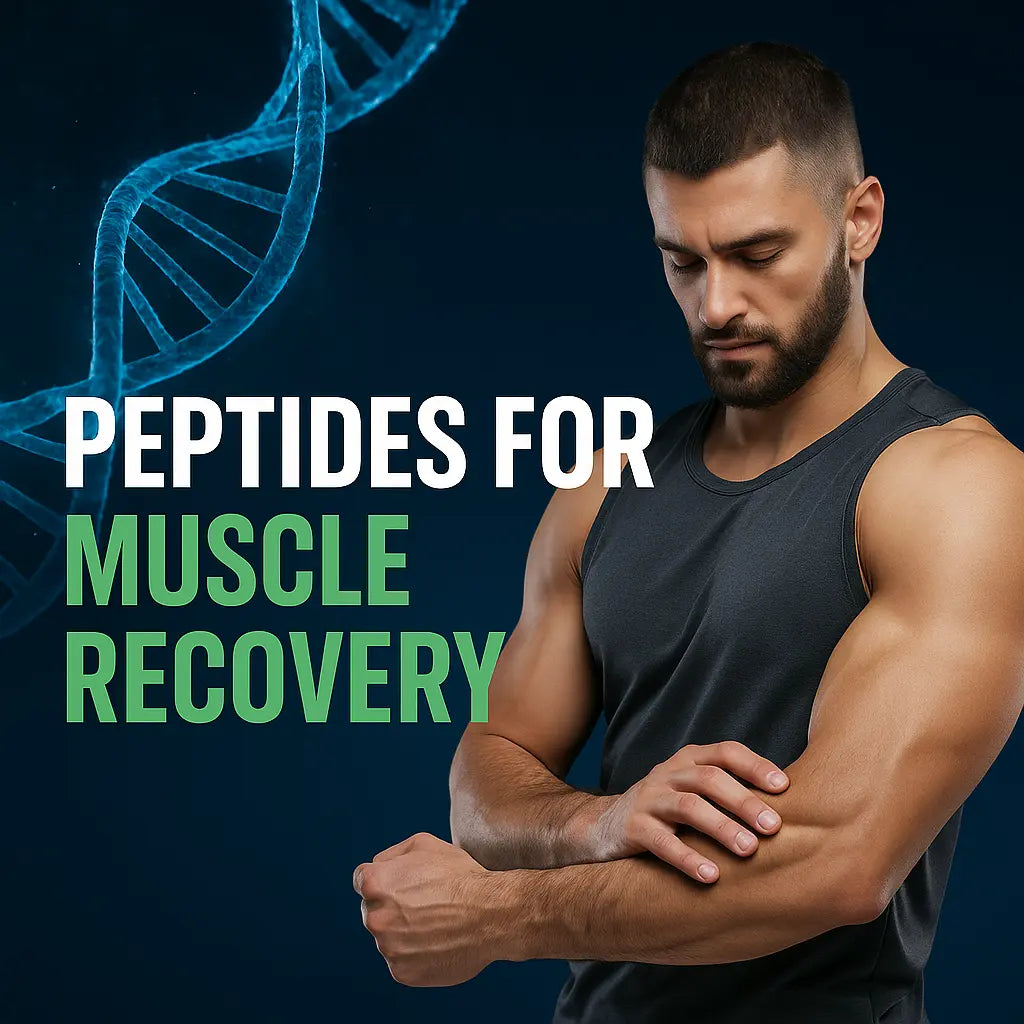
Peptides for Muscle Recovery: Top Methods to Speed Up Healing
Share
Peptides for muscle recovery are revolutionizing how athletes and fitness enthusiasts accelerate healing and improve muscle repair after injury or intense workouts. These short chains of amino acids act as biological messengers that trigger targeted repair and growth processes in the body, offering a scientifically promising alternative to traditional recovery methods. Understanding which peptides are most effective, how they work, and how to use them properly can provide a significant edge in reducing downtime and enhancing muscle healing. In this article, we explore the top peptides for muscle recovery, their benefits, mechanisms, and practical application methods to help you optimize your healing journey.
Understanding Peptides for Muscle Recovery
What Are Peptides?
Peptides are short sequences of amino acids linked together, often consisting of 2 to 50 amino acids. Unlike full proteins, these smaller molecules can easily penetrate cells and communicate with specific receptors on tissue surfaces. This specificity allows peptides to modulate precise biological processes such as muscle growth, inflammation reduction, and tissue regeneration— all crucial components of muscle recovery.
How Peptides Aid Muscle Repair
Muscle repair peptides work by stimulating key cellular pathways that encourage the repair and regeneration of damaged muscle fibers. They promote collagen synthesis, increase blood vessel growth (angiogenesis), and reduce inflammatory mediators around the injury site. This multifaceted approach not only speeds up recovery but also improves the quality and strength of the repaired muscle tissue, reducing soreness and the risk of re-injury.
Most Effective Peptides for Muscle Recovery
BPC-157: The Healing Catalyst
BPC-157, a synthetic peptide derived from a naturally occurring gastric compound, is well-known as one of the best peptides for muscle recovery. It promotes tendon and ligament repair, supports muscle regeneration, and significantly reduces inflammation through enhanced vascular growth and fibroblast activity.
TB-500: Broad Tissue Repair Support
TB-500, a synthetic version of thymosin beta-4, works systemically to mobilize cells necessary for repair across muscles, tendons, and ligaments. It regulates actin in cells, improving their migration to injury sites, and reduces scar tissue formation, allowing more flexible and functional healing.
Mechanisms Behind Muscle Repair Peptides
Cellular Signaling and Protein Synthesis
Muscle repair peptides bind to receptors on muscle and connective tissue cells to activate signaling pathways like the AKT/PI3K and MAPK cascades. These pathways contribute to increased protein synthesis, satellite cell activation, and muscle fiber regeneration, ultimately resulting in faster and more complete repair.
Angiogenesis and Inflammation Modulation
Peptides such as BPC-157 stimulate vascular endothelial growth factor (VEGF) and promote the formation of new blood vessels. This enhanced blood supply delivers oxygen and nutrients critical to tissue remodeling. Additionally, peptides help reduce pro-inflammatory cytokines, decreasing swelling and pain associated with muscle injuries.
Application Methods of Peptides for Muscle Healing
Injectable Peptides
Most peptides, including BPC-157 and TB-500, are administered via subcutaneous or intramuscular injections near the injury site or systemically for broader effects. This method ensures rapid absorption and localized targeting but requires sterile technique and proper dosing.
Oral and Topical Options
Some peptides like MK-677 mimic growth hormone release and are taken orally to support muscle preservation and healing indirectly by increasing overall growth hormone levels. Research on topical preparations is ongoing but may provide a non-invasive alternative in the future.
Benefits of Using Peptides for Muscle Recovery
- Faster tissue repair: Accelerates healing of muscle tears, strains, and ligament injuries.
- Reduced inflammation: Limits chronic inflammation that can delay recovery.
- Improved muscle strength: Enhances quality and functional recovery of healed tissues.
- Decreased downtime: Speeds return to training and performance.
Complementing Traditional Recovery
While peptides provide powerful tools, combining them with proper rest, nutrition, hydration, and physical therapy will maximize outcomes and minimize reinjury risk.
Choosing the Best Peptide for Muscle Recovery
Factors to Consider
Finding the best peptide for muscle recovery depends on the type and location of injury, desired speed of healing, and legal considerations, especially for athletes subject to anti-doping regulations. Peptides like BPC-157 offer targeted tendon and muscle healing, whereas systemic peptides such as MK-677 can help preserve muscle mass during recovery.
Product Sourcing and Quality
Because most muscle repair peptides are sold as research chemicals or supplements, quality and purity vary widely. Always choose products from reputable suppliers and consider medical supervision to ensure safe and effective use. Explore our peptides collection for trusted options tailored to muscle recovery.
Safety and Considerations When Using Peptides for Muscle Healing
Potential Side Effects
While peptides are generally well-tolerated, users may experience injection site reactions, mild digestive symptoms, or hormonal fluctuations depending on the peptide type. More serious effects are rare but underscore the importance of medical guidance.
Legal and Ethical Issues
Many peptides used for muscle repair are banned by sports regulatory bodies such as WADA due to their performance-enhancing effects. Athletes should verify compliance before use. Additionally, peptides are not FDA-approved for muscle recovery, making informed decisions and risk awareness vital.
Integrating Peptides into Your Muscle Recovery Routine
Combining Peptides with Nutrition and Training
Peptides for muscle recovery work best when paired with an adequate protein intake, anti-inflammatory diet, and a well-designed rehabilitation program. Supportive supplements like collagen peptides and antioxidants can also enhance tissue healing.
Consulting Healthcare Professionals
Before starting any peptide regimen, especially injections, consulting a healthcare provider experienced in peptide therapies ensures the right protocol, dosing, and monitoring to maximize benefits and minimize risks.
Summary: Peptides for Muscle Recovery Enhance Healing and Performance
Peptides for muscle recovery offer cutting-edge support to accelerate healing, reduce inflammation, and improve muscle and connective tissue repair after injury or intense exercise. Among these, BPC-157 and TB-500 stand out for localized and systemic effects respectively, while oral peptides like MK-677 provide hormonal support that preserves muscle mass. Their mechanisms involve complex cellular signaling and angiogenesis, making them powerful allies in muscle healing. When combined with proper training, nutrition, and professional oversight, peptides can shorten recovery times and help you get stronger, faster. To explore the most effective peptides for your recovery needs, visit our peptide products and start your healing journey today.

